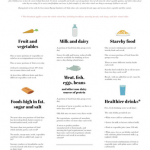
The new standards, which are designed to make it easier for school cooks to create imaginative, flexible and nutritious menus, will become a legal requirement for schools in England from 1 January 2015. (1)
Current school food standards were introduced in England between 2006 and 2009. Whilst they have helped to improve the nutritional quality of the food being served in most schools, they have been complex, inflexible and expensive to enforce. Consequently they were reviewed by a panel of experts as part of the School Food Plan in 2013, and the new food-based standards were created following an online consultation.
The new standards aim to deliver the energy and nutrients that growing children need, including complex carbohydrates, protein, fibre and a range of vitamins and minerals, while restricting the nutrients we are having too much of as a nation – saturated fat, sugar and salt. They do this by promoting an appropriate balance and variety of foods from the four main food groups – starchy foods, fruit and vegetables, protein-rich foods, and milk and dairy foods.
|
The new standards include:
|
Just as importantly, the standards promote the idea that ‘Eating in school should be a pleasurable experience…food that looks good and tastes delicious…in a pleasant environment where they can eat with their friends’. They promote fresh, sustainable and locally-sourced ingredients – and highlight that ‘children love to hear the stories behind their food’ – we couldn’t agree more here at PhunkyFoods!
These measures are not about draconian bans on every trace of sugar or fat, or taking away parental responsibility for their own children’s health. They’re simply about making healthier choices the easier choices.
The new standards will apply across all local authority maintained primary, secondary, special and boarding schools and Pupil Referral Units in England, plus academies created prior to 2010 and after 2014. (Academies set up between 2010 and 2014 are being asked to make a voluntary commitment with the regulations). As previously, the new standards don’t apply to occasional activities eg parties or celebrations to mark religious or cultural occasions, fund-raising events etc.
For more information, visit www.schoolfoodplan.com/standards
References:
1. DRAFT The Requirements of School Food Regulations 2014. Department for Education: London.

 1 or more portions of vegetables or salad as an accompaniment every day
1 or more portions of vegetables or salad as an accompaniment every day deep fried, batter or breadcrumb coated food limited to twice a week
deep fried, batter or breadcrumb coated food limited to twice a week
